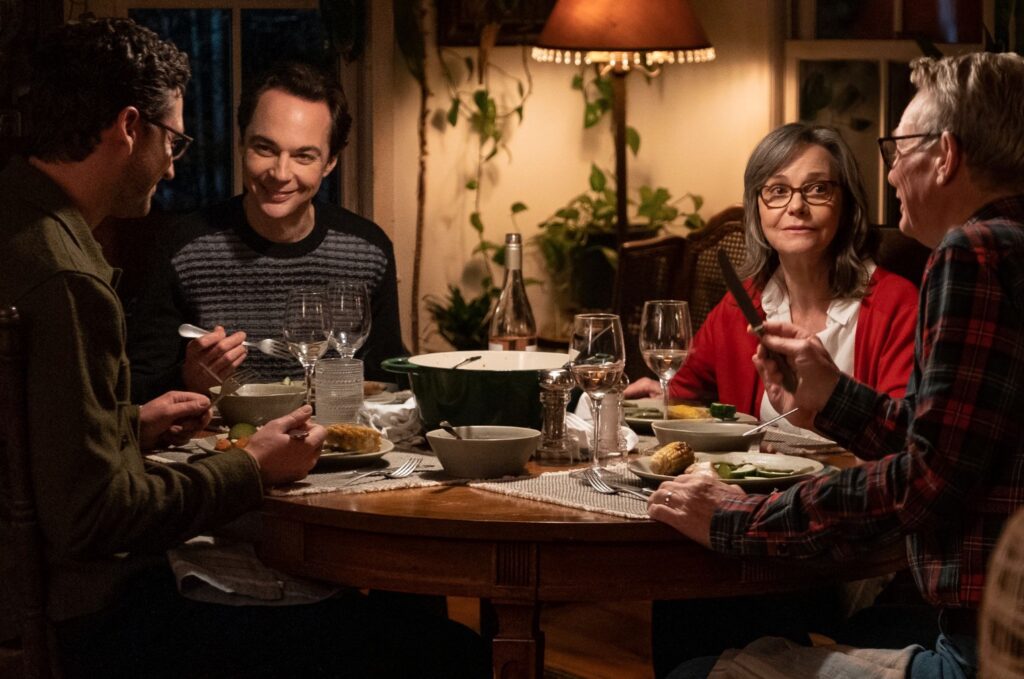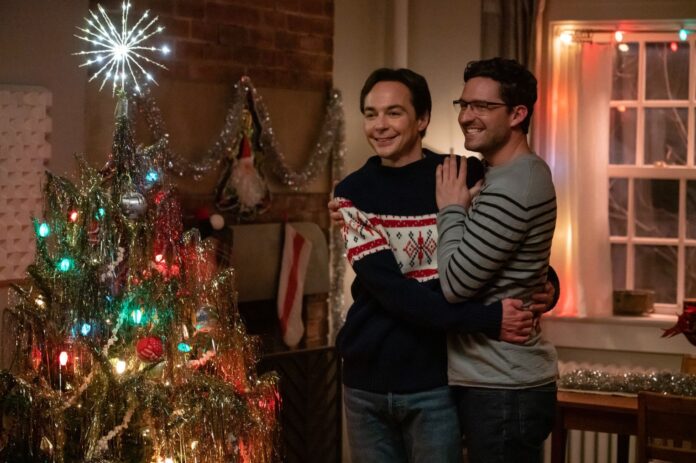David Marshall Grant began his career as an actor back in the late 1970s in films such as “French Postcards” and “Happy Birthday, Gemini,” (the latter set and shot in Philadelphia). He also memorably played a gay character in the Philadelphia-set TV series, “thirtysomething,” from 1989 to 1990. He was nominated for a 1994 Tony Award for Best Actor for his performance in “Angels in America,” and is himself a playwright, penning “Snakebit,” and other plays. In recent years, he has been working as a writer for various TV series including “Brothers & Sisters,” “Smash,” and “A Million Little Things.”
Now Grant has co written (with Dan Savage) the screenplay for the feel-good tearjerker, “Spoiler Alert,” about Michael Ausiello’s (Jim Parsons) relationship with Kit Cowan (Ben Aldridge), his partner of 14 years, who is diagnosed with cancer. The film, directed by Michael Showalter (“The Big Sick”), is based on Ausiello’s memoir of the same name.
This life-affirming drama recounts how Michael, a journalist for TV Guide, and Kit, a photographer, meet at a bar, fall in love, have difficulties in their relationship, and then grapple with terminal illness. “Spoiler Alert” handles the couple’s relationship and the narrative with sensitivity but also with humor. Scenes depict Michael imagining his childhood as well as moments of his life as a sitcom complete with a laugh track.
Grant, who has a cameo in the film as a therapist, spoke with PGN about turning Ausiello’s life story from page to screen.
Let me start with a question Michael Ausiello might appreciate: What would the TV show of your life look like?
Well, I don’t think it would be on network television. I think it would be hard to get made because each season would be very different. I’ve lived a very episodic life. I was an actor, I was a playwright, I was a television writer. I tried to be straight, I was gay. There were just a lot of eras in my series. It would be hard to make a linear version of it.
What observations do you have about Michael Ausiello from his memoir?
Michael is so willing to be honest about himself. He managed to capture a relationship in all its beauty, messiness, love, and complication. The other thing is that Michael Ausiello is so funny. His ability to see his life through humor and the lens of television — which is so much what the book and film is about — gives us that rare ability to look at it from a slightly detached place so we can laugh and see it in a way that just makes us smile.

There are several narrative strands and devices in the film: flashbacks, a voiceover narrative, the use of photographs and videos, as well as a real meta moment. Can you talk about your approach to adapting Ausiello’s story?
Michael continually uses his love of TV and the way that he sees his life in the context of that to help tell the story of his own life. We felt the best way to tell the story in film was to find a cinematic equivalent to that. You really see him as a kid the way he saw himself as a kid or how he wished he was as a kid — the star of his own sitcom. Michael processes his life as a sitcom and experiences all the terrible things by putting it in a set and giving himself a laugh track. He finds a purpose for his suffering and for the painful parts of his childhood, including his mother’s death, to be processed in a way he can experience it with even a measure of joy because TV was such a saving grace for him as a kid.
It is quite profound what he does seeing his life that way, and it was one of the ways we wanted to keep the brilliance of what he does in that memoir alive in the cinematic way, so the story wasn’t told in a simple linear fashion. It was to understand this character getting through this the same way he tried to get through his childhood: through the magic and intoxicating medium that is TV.
I love the witty quips in the early romantic scenes, as well as the poignant episodes. How did you develop the film’s melancholic tone, which never gets mawkish?
The melancholy or sadness speaks to the characters’ vulnerability. Michael is clearly vulnerable. As you get to know Kit more, you realize he’s not out to his parents at a pretty advanced age. You see he is vulnerable, too. Part of the greatness of what Michael Ausiello was able to talk about in his memoir is that they use this tragedy to really understand each other and themselves as a couple and truly embrace the love they always had. They [develop] such an understanding of who they were as a couple and who they were individually.
If we can talk about your career, I’m curious first about your playing gay roles and how you navigated that especially in an era where being an out actor or playing queer was career suicide?
I began my life as an actor at 23. I had just graduated from drama school and to be [openly] gay would have been the end of my career before it had started — and it was certainly how I felt. I get to go to the O’Neill Playwrights Conference, and I get to be in a play. It turns out to be “Bent.” So, I do it. It’s a great play, a great part. I do [my first film] “French Postcards,” and then I’m offered “Bent” on Broadway with Richard Gere. How do you say no to that? I do “Bent” in New York, and I’m “straight;” the New York Times runs an article where I talk about my girlfriend, who was sort of my girlfriend at the time. I was just determined not to be seen as gay, but it just kept happening.
Then came “thirtysomething,” and I was told not to do it by a lot of people. But it’s a great part. I was beginning to leave my dreams of being a movie star behind, so maybe in 1986, maybe, there was a place to be a gay actor — maybe? So, I did “thirtysomething,” and I don’t regret it for a minute. Then it kept going. I did “And the Band Played On,” and I wrote a play, “Snakebit,” about my life as a gay man, and I ended up in “Angels in America.” That was when the gig was up, and I was just going to be gay. I conveniently kind of stopped acting around then, too. My point is that I tried so hard to be something I wasn’t — a heterosexual movie star — and I ended up being who I was, a gay man who was a writer and actor. It’s not so much the courage it took to be who I was, but it was you can’t fight it after a while. Maybe there are people that can. For me, I wanted love, a family, and the things being honest was going to give me.
